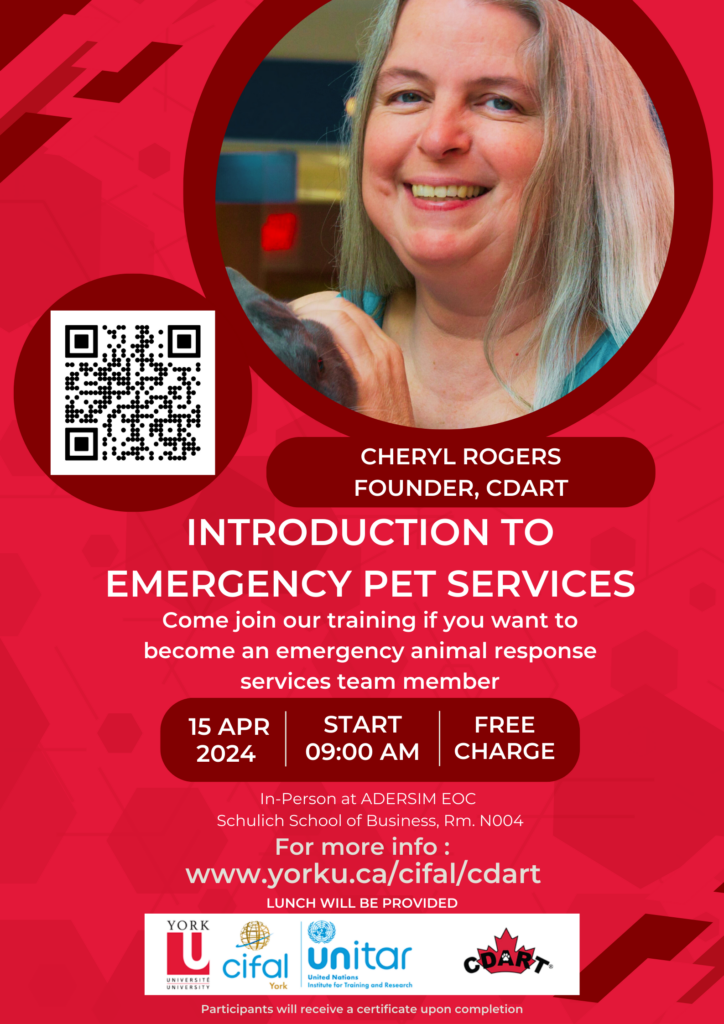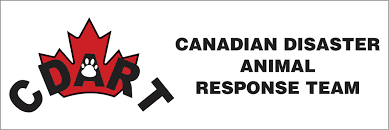
A Free Full-Day Training Course from CIFAL York
This course is ideal for emergency pet services volunteers; animal welfare employees; government agency employees; pet care professionals; professionals, researchers, academics, and students in emergency management or related fields; and individuals interested in emergency pet services.
Course Schedule
April 15th, 2024 - 09:00AM - 4:30PM EDT
Location
ADERSIM EOC - Schulich School of Business Rm. N004
111 Ian MacDonald Blvd,
York University, Keele Campus
North York, Ontario
Lunch will be provided
Spaces are limited and will be reserved on a first come, first served basis
Register
Participants who successfully complete the course will receive a certificate of completion

Course Instructor
Cheryl is a founder of CDART (Canadian Disaster Animal Response Team) and has deployed to Firestorm in 2003, Katrina in 2005 and Fort McMurray in 2016 as well as many smaller local emergencies. She is the CDART liaison with the BC government and represented CDART as part of the earthquake consultation with Henry Renteria.
The Canadian Disaster Animal Response Team (CDART) provides disaster response services for domesticated animals. They rescue, shelter and care for pets and livestock during disasters/emergencies when people are forced to evacuate and cannot care for their own animals.
CDART began in 2003 after the wildfires in Barriere, Kamloops and Kelowna. They deployed to those fires as Noah's Wish volunteers but decided they needed a group of specially-trained, dedicated volunteers from/for Canada.

Course Description
CDART's Introduction to Emergency Pet Services course provides information on community animal disaster response and which animals are included in emergency response. We will review the emergency management incident command system and how animals are handled within that system.
Participants will learn about communication, worker care and other items useful to disaster response team members. There is a table top shelter exercise and forms used to document animal care during a response are provided.
You will learn how to prepare a Grab & Go Kit for pet(s) and the steps to take before you can effectively deploy to disasters. At the end of this course, you will be able to assist animals and their people in the event of a disaster in your community, responding as a member of an emergency pet services team.

Course Learning Objectives
After taking this course participants will:
- Understand how animals are handled within the emergency response system.
- Learn about worker care and other items useful for disaster response team members.
- Be able to understand and work within the Emergency Management & Incident Command System.
- Learn best communication practices and how to communicate effectively in emergency response situations.
- Be able to prepare Grab & Go Kits for pets.
- Be able to effectively deploy to disasters.
- Be able to assist animals and their people during emergencies as part of an emergency pet services team.

Course Approach
This full-day course will allow each participant to develop the skills needed to work within the Incident Command System (ICS), manage and support fellow team members, and serve as a responder on an emergency pet services team. Participants will also take part in a table-top exercise simulating a response scenario in a shelter.
Register
This course is being presented in collaboration with the Canadian Disaster Animal Response Team

Organizers & Partner

Organizer
CIFAL York is part of UNITAR's global network of training centres for knowledge-sharing, training, and capacity-building for public and private leaders, local authorities, and civil society. CIFAL Centres are local and regional hubs for innovative, participatory and co-creative knowledge exchange opportunities to support decision-making processes, build capacity, and accelerate the implementation of Sustainable Development Goals. Established in 2020, CIFAL York started its operation in June 2021 as the first CIFAL Centre in Canada. Health and Development training and knowledge sharing is among the key focusing areas of CIFAL York.
For more information or questions, please contact: cifaldirector@yorku.ca

Organizer
Canadian Disaster Animal Rescue Team
The Canadian Disaster Animal Response Team (CDART) is a volunteer-based organization dedicated to animal welfare in times of a disaster or emergency, by providing sheltering, fostering or rescue of domesticated animals.
Our dedicated volunteers are mobilized when local authorities request our assistance, and when the Provincial Emergency Program's Emergency Social Services is activated. We have well-trained, established teams in specific communities, but we will answer requests for help from local, provincial and federal government agencies. We can determine if an Animal Intake Facility needs to be established for the displaced animals and, working with Emergency Social Services at Reception Centres, we register and care for the animals in need of shelter or evacuation.
Because of our belief in awareness and readiness, we participate in public education and fundraising events, offer training, have developed emergency response kits, establish emergency response supply agreements with local businesses and approve foster homes, etc.

Partner
The research team has conducted over 80 individual interviews with Chinese ethnics in the Greater Toronto Area and in Kenya to understand their experience of anti-Chinese stigma during the COVID-19 pandemic, how this experience impacted their lives during the pandemic, the protective actions they took and what support they received.
Currently, the research team is working on a stigma focused agenda for emergency management as part of the broader concept of Emergency Management for All. The major focus of this aspect of the research agenda is to understand how emergency managers are impacted by stigmatization during an emergency and the appropriate role emergency management could play in reducing the impact of stigmatization in an emergency.
We are focused on developing a holistic approach to emergency management and reducing vulnerabilities that are exacerbated by issues such as stigmatization.
Our study uses critical risk information to support community resilience actions that build social counter measures to support emergency management response during an emergency. We undertake scientific research that enhance the requisite capacity for responding to and recovering from COVID-19 and other future emergencies.
Through our research, we will support the development of destigmatization campaigns that will be conducted, both online and through community engagements, with emergency management professionals.
This event is partially funded by the Faulty of Liberal Arts and Professional Studies (LA&PS) minor grants to Dr. Aaida Mamuji
